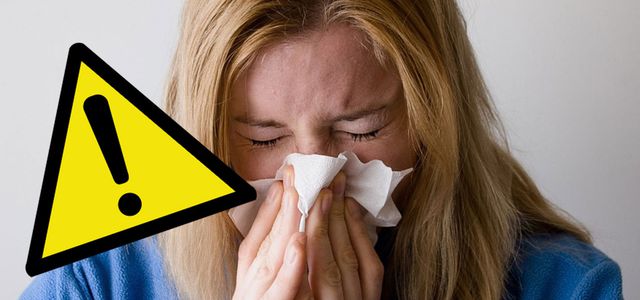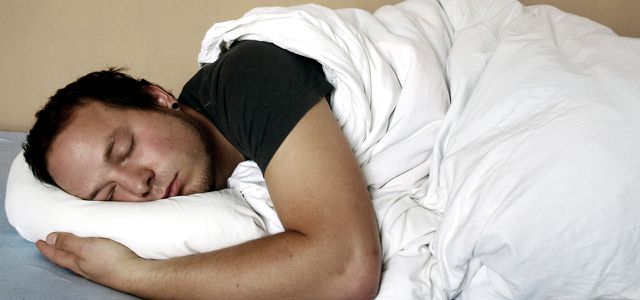
The nose runs, the throat scratches and the head hurts: a cold catches almost everyone in winter. There are many home remedies that will help – but also some that do the opposite. This won’t make the cold any worse.
A common cold is relatively harmless, but if you are reckless or do not treat it properly, you risk spending the entire winter with a runny nose. That’s why you should avoid these nine mistakes when you have a cold:
1. Use nasal spray incorrectly
Nasal spray gives you quick relief from a blocked nose – but you should be careful not to use the spray too often or for a long time. Once your mucous membranes have got used to the active ingredients, it can happen that the nasal mucous membranes swell even more.
If you then continue to use nasal spray, you run the risk of a chronic runny nose. The irritated nasal mucous membranes can dry out and no longer fulfill their defensive function – which in turn clears the way for germs. You should therefore at best use nasal sprays use for a week. Even better: use your own nasal spray.
2. Blow your nose vigorously and pull up your nasal mucus
A runny nose is uncomfortable, and constant sniffling and pulling your nose up too. But somehow you have to get rid of the nasal mucus. Blowing your nose hard, however, is not helpful because you press the secretion into the sinuses up to the ear trumpet. In the worst case scenario, this can lead to sinus infections and otitis media.
Instead, pulling up the nasal mucus and swallowing it down the throat does not make sense either. The infectious secretion can trigger a sore throat or throat infection. Better: dab off the nasal secretions or blow your nose with little pressure.
3. Stay in bed
Anyone with a cold often feels tired and tired – and therefore prefers to crawl into bed. This helps the body with a simple cold but only to a limited extent. It is better to wrap yourself up warm and take a walk in between. This is good for the circulation and the irritated nasal mucous membranes. This does not apply to a fever – bed rest is necessary and appropriate here.

4. Suppress sneezing
Sneezing is loud, unappetizing – and therefore unpleasant for us in public. But we’re not equipped with the sneeze reflex for fun. It ensures that foreign objects such as dust, viruses and bacteria are removed from the nose. Those who suppress sneezing direct the pressure that is actually supposed to throw the foreign bodies out of the body inwards.
This can create excess pressure in the ear that is uncomfortable. What you should still pay attention to when sneezing: Don’t sneeze into your palms, but into the crook of your arm. In this way you save your fellow human beings from flying viruses and bacteria or a contaminated handshake. This is more important than ever, especially in times of the corona pandemic.
5. Drink warm milk with honey
A cold usually also brings with it a cough. Warm milk with honey sounds beneficial – but is not helpful for coughing. The drink stimulates the build-up of mucus in the throat and even promotes coughing. Instead, it is better to use teas, ginger, sage, thyme and ribwort tea are particularly helpful.
Read also:
- Öko-Test cough and bronchial teas: No effect and many pesticides
- Onion juice against coughs: Make your own cough syrup from onion and honey
6. Exercise too soon
If you have a cold, you should go for a walk with your clothes on, but not do any sport. Because exercise in a viral infection harms the body: When you catch a cold, the immune system works harder than usual to fight the pathogens. The exertion of exercise is an additional stress factor. If our immune system uses up its reserves for this, it can no longer do anything against the pathogens. The same applies to bacterial infections.
In addition: In the case of a flu-like infection, sport can lead to the pathogens attacking the heart and causing myocarditis – and this can sometimes even be life-threatening. Especially if you have a fever, you should definitely not exercise.
If you have a mild cold, you can return to exercise as soon as the symptoms subside. After a feverish infection, you should take a break for at least a week. Listen to your body and only do as much exercise as is good for you.



7. Treat the common cold with antibiotics
Antibiotics only work against bacterial infections, but colds are in the vast majority of cases viral infections. Here they are of no use, they actually do harm: the more often antibiotics are used, the greater the risk that bacteria will become resistant to the drugs. Natural antibiotics in the form of medicinal plants are better.
8. Sweat out a cold
It is a good idea to sit in the hot bathtub if you have a cold, then wrap yourself up warm and go to bed with a hot water bottle. However, trying to sweat out a cold in the sauna is not a good idea. The hot air puts additional strain on the already weak circulation. A visit to the sauna also helps germs to multiply better. If you have a cold, you should avoid the sauna.
9. Go to work
A cold usually doesn’t tie you to bed straight away. Nevertheless, it makes sense to stay at home for the first two to three days of an infection – this is the time when the risk of infection is greatest with a cold. Once the symptoms subside, you can go back to work. However, it is advisable to keep a little distance from colleagues, friends and family members until all complaints are over. During the corona pandemic, anyone who experiences symptoms such as fever, dry cough or sore throat should definitely stay at home and seek medical advice over the phone.
By the way: drink hot lemon …
… does not make your cold worse, because lemons contain a lot of vitamin C, their regular consumption strengthens the immune system and helps to get rid of a cold. Hot lemon is therefore often praised as a tried and tested home remedy – but unfortunately there is one crucial problem: Vitamin C is sensitive to heat and is lost in hot water. So instead of mixing lemon juice with boiling water, use lukewarm water. A temperature of 40 degrees Celsius is ideal.
Read more on Techzle.com:
- 6 herbal home remedies for a cold
- These 7 medicinal herbs are natural pain relievers and antibiotics
- Turmeric (curcumin), the Indian spice with medicinal properties
- strengthen your immune system: 10 natural tips for better defenses